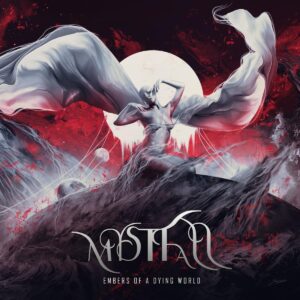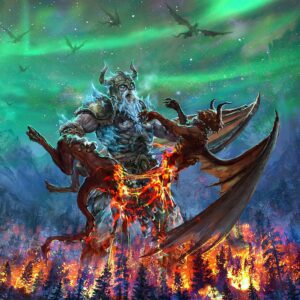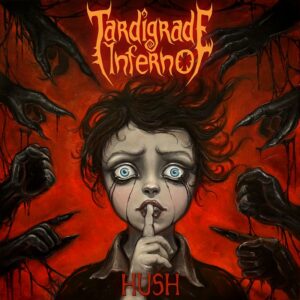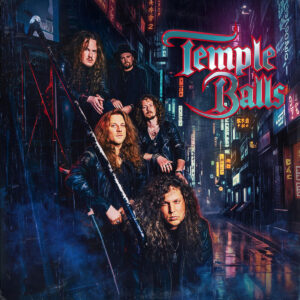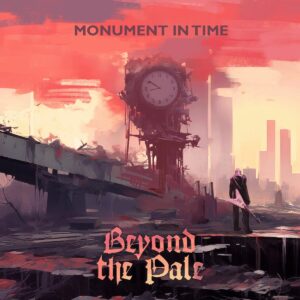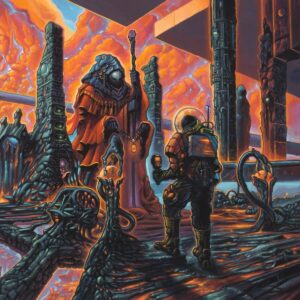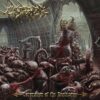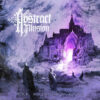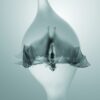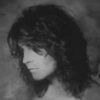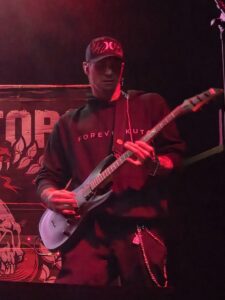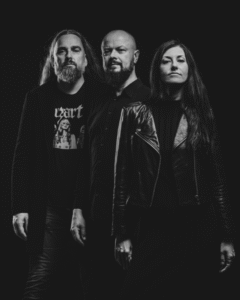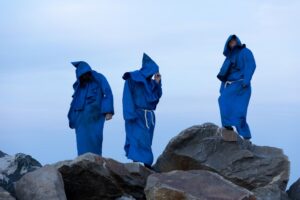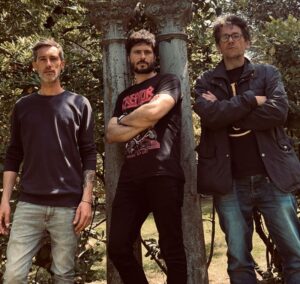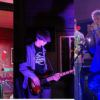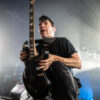Jon Pyres
Threads of Fate

•
April 16, 2022
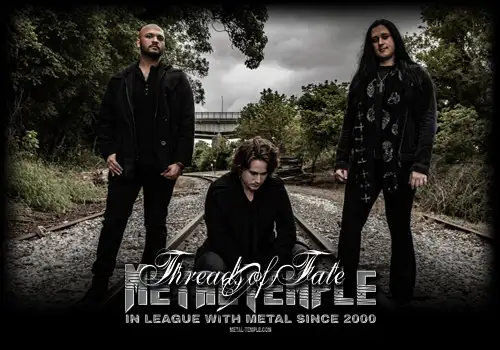
Jon Pyres – It's a pretty crazy story actually, which inspired the name a little bit. In 2016 summer, I moved back to Florida, back when Prog Power was in September. I had been in Atlanta for a couple of years. Pretty much right after I moved back, I decided to attend Prog Power 2016, because I'd never been. I had friends who offered me a ticket, so I went and I met Adrienne (Cowan, SEVEN SPIRES vocalist) at this festival. We exchanged info, and connected on FaceBook and all that. She introduced me to Jack, via FaceBook, then we started talking because we shared a lot of the same musical tastes and bands and all. At this time, I was attending music school. I was attending Full Sail online for musical composition and part of my assignments was writing music. I had written the beginning, or the skeleton, of what eventually became The Reaping, which is a track off the debut EP for THREADS OF FATE. I showed the demo to Jack and he liked it, and he offered to do guitars and whatnot for it. And that's kind of how it started. Then eventually I came up with the name, and Vikram joined shortly after.
JP – Vikram and I were at Prog Power together but didn't really get a chance to talk. We added each other on FaceBook later and then he ended up joining the band.
JP – It's an incredible networking opportunity. I'm lucky my friend Paul, he's one of the sponsors, offered to take me. That was pretty incredible because that is one of the moments that led to the creation of THREADS OF FATE.
JP – And he also wrote the piano for "Ashes," the closing track.
JP – He is incredible.
JP – The thing about him is that he's such a versatile musician, he can literally do anything.
JP – He can literally write anything. This guy, being close friends that we are, he shows me everything he does. Just BS'ing around, I've heard him write pop music, arena rock. Fun fact, we're working on a kind of arena rock/80s/synth wave project that we're trying to do eventually. He's excellent at writing synth wave, he's great at writing metal, he can write death metal as you saw with "The Horrors Within," he's tremendous at writing prog metal, and he's an amazing orchestrator. His scoring work is unbelievable. He can do everything.
JP – Yeah, that's kind of the feel that we go for. We want to have a bunch of bombastic elements, but the main goal is to have atmosphere. Whenever I write a song or material for the band, he basically takes whatever I write on keyboards, he makes it better. He embellishes it.
JP – He does that very well, it's scary how good he is at that.
JP – And I think that's one of the coolest things about this, because you know it's Jack, but you wouldn't think, "Oh that's SPIRES."
JP – Maybe there was a hint of that in "Against The Shores Of Le Monde," which he and I co-wrote, even still, it's separate, on it's own. That's sort of the beauty of this project, because it's sort of an outlet for the three of us. We get to do things we wouldn't do outside of it. It's a fun thing for everyone involved.
JP – Oh yeah, definitely. It's a very wholesome group of people. I'm eternally grateful for the opportunities they've given me. They've given me a lot and I'll never deny that.
JP – Adrienne really hit the ball out of the park with that one. I was very honored to be a part of that.
JP – It was pretty crazy, but it's so well written that it works.
JP – For that one, we wanted to close the record on a very somber note.
JP – The idea was to have something that sounds like a movie score piece, but with singing over it.
JP – That's precisely what we go for. One of the main goals when I started THREADS OF FATE is that I wanted listeners to have images from hearing the music, I wanted the music to give them images. It was very vision driven.
JP – That's one of my favorite songs.
JP – There's actually no screaming in "Ashes" at all.
JP – Honestly, I couldn't tell you how. I learned how to do harsh vocals on my own, many, many years ago, before I ever even started singing. I didn't even start singing until our EP. I kind of became a singer overnight for that, out of necessity.
JP – Thanks, man!
JP – When we recorded the EP, I was still learning how to sing. When I started the project, I had the idea in my head of I was going to be the songwriter and keyboardist. It was never my intention to sing on this. It was not in my head at all when I started this. I was either going to have someone else sing, or have various different singers on different songs. I basically came to the conclusion that it was going to be too much of a pain, so with the encouragement of Adrienne, who had given me vocal lessons at that point, and the encouragement of Jack and Vikram, I said "screw it" and decided to become the singer.
JP – It total had that feel. Yeah, that's pretty much how it ended up being.
JP – I would say even now I'm still learning and evolving as a singer. It's only been a couple of years.
JP – Thanks, that means a lot. It's been a lot of hard work. I won't deny that. It's been a lot of blood, sweat and tears. I'm really happy with what I've done what I've done so far and looking forward to what I can do going forward.
JP – I'm glad.
JP – Not to get too in depth, but the inspiration for that song is a night where I was laying on a field and there were no starts or anything. I was just staring up, so that's exactly the kind of imagery I was going for.
JP – Everybody in the band, we listen to metal music, and of course a bunch of different things, but we are all really big fans of film scores. I myself have loved movie scores for as long as I can remember. Anything Danny Elfman, Hans Zimmer. Things like that. I love all these guys, and so do the others in the band. A big goal with THREADS OF FATE was getting the movie score feel while mixing in the metal.
JP – Yeah, Vikram is just Vikram. Whether it's him writing a whole song or taking something, I write and making it better, he just has that gift.
JP – That song is so funny to me because we literally wanted to go for so many different things in that song, like we wanted to go for doom and something just sinister and evil and have elements of OPETH and SWALLOW THE SUN in there. It's a mix and match of a bunch of different stuff.
JP – Yeah, he pulled out the Hammond.
JP – That moment of the song is what I call the OPETH moment of the song.
JP – 33.
JP – That's totally accurate though, because DEEP PURPLE and bands of that era used that sound a lot. Of course, RAINBOW is a band that used it a lot.
JP – It had that 70s moment, mixed in with the OPETH style growling, then it goes back into the chorus and has a very black metal style ending.
JP – That's another funny story. Growing up, I played a lot of video games. The majority of them were fantasy themed, and RPG games on SquareSoft, way back before it was SquareUnix. I played a lot of Castlevania, and there was this one game called Vagrant Story, I must have been eight or nine years old when I played it obsessively. That song is based on that game. It was a very dark storyline that had elements of necromancy and magic and a very dramatic plotline. The setting of the story is in a fictional city in medieval France called Le Monde. In that city, the dead were rising during the telling of the story.
JP – Yeah, only people who played that game would know the story behind the lyrics because there's so many nods to it.
JP – That song is probably the most metaphorical on the record.
JP – Or the light within. It can be taken in so many different ways. That's one of my favorite things in music, whenever people write music or lyrics that you can apply to literally anything. So that's something I try to do my best with. Even though I'm giving it my own meaning, I try to write it ambiguous enough that everyone can give it their own meaning.
JP – Both are great bands.
JP – That's awesome because that is one of my favorite films ever. I grew up watching that film. With this record we wanted to go with a super haunting atmosphere. Very ghostly.
JP – It was a big catharsis. I basically wrote out a lot of what was going on in my life at the time on to a record. I learned that as an artist, I'm able to emote really well with my singing. If I had to pick something I'm really proud of, or something that I favor about my singing, it's that I'm able to emote. I'd say those are my biggest takeaways from it.
I didn't even know what to ask because there's so much I want to know.
JP – That's good. I think a good interview is more like a conversation than anything else anyway.
JP – Yeah, and that's the correct term for it.
JP – Uh huh.
JP – Aw, thanks, man.
JP – Yeah, I've been singing for nearly five years total. I've had a lot of help along the way. I started with Adrienne. She gave my first couple of voice lessons. Then I had a few others after that, and my recent go to is David Akesson, who is also Adrienne's voice teacher.
JP – Amazing! That man is a freaking surgeon with vocals. I cannot recommend him enough to anyone who is interested in singing. He is a magician.
JP – Oh yeah, he will seriously level you up. He did that with me. I'm really excited to do all the vocal things I will be doing in the future, because thanks to him, I've completely leveled up since we recorded this record.
JP – What's awesome about him is that he makes learning so comfortable and easy. There's no sort of awkwardness. He makes the whole experience comfortable, which is important. If you aren't, it makes learning more difficult.
JP – What you are referring to, the cry and all that, I honestly end up do that very subconsciously. Half the time I'm even trying to do it, and that's the massive influence that a lot of other singers have had on me. If I point it out to you, you'll probably hear a lot of EVERGREY in the vocals because I'm a huge EVERGREY fan.
JP – If I had to pick one main vocal influence, it would be Tom Englund.
JP – It's not done, but for now it is a studio project. Everyone in the band is so busy with everything else their doing. I very much want this to remain something the guys doing because they love doing it or because they find it fun. I want it to be a release for them just like it is for me. For now, it will stay a studio project, it'll be a while before we start to work on new material. SEVEN SPIRES is incredibly busy right now and that takes up most of Jack's time. Vikram is busy with SILENT SKIES and REDEMPTION and LUX TERMINUS and the 50 other bands that he's in. I myself, I have my projects going on. I have LYCANTHRO now. I have a project with the CALAMUS keyboardist. We're actually recording music for that right now. I'm supposed to track vocals for that tomorrow actually. Then I have an 80s music project that I'm trying to work on with Vikram and Andreas Nergard from the band NERGARD. There's another project with a good friend of mine that's in a band called BLOODY HEELS, also a huge favorite band of mine. So, yeah, we're all immersed in a lot of different projects and super busy, so THREADS is something we just do when we can.
JP – Great. I'm seeing him on the 12th, next week.
JP – I love Chris, he is an incredible drummer and human being and his solo records are absolutely nuts.
JP – He's a really talented kid. It's crazy, the fact he's so young and talented now, imagine how good he's going to be later on.
JP – He really is super nice.
JP – Yeah, he's a freaking monster. When drum recording started, I had no doubt he was going to do that in that fashion.
JP – That's the best thing about him, he's the total package. He's got groove, he's got soul. As a player, he can literally anything. He's got chops, he's got technique. The word solid falls short.
JP – He just kind of picked up guitar for that project. It's ridiculous.
JP – I'm truly blessed to be working with such people. It's not something everyone gets to do, so I'm extremely grateful to have these people around.
JP – I honestly don't know where it comes from. I basically just hear it. Whenever I write something for THREADS, I hear the whole song in my head, then I just flesh it out on keyboards and software or whatever.
JP – Yeah, I constantly hear new melodies and music in my head all the time. I just sort of pick and choose what I want to turn into a song.
JP – Honestly, there was nothing like that. To me, the concept of the album, this is what it means to me personally, it's not literal death. It's more the death of who you were as a person, or the death of certain qualities. You sort of become something else after. It was very much based on personal experiences I had at the time, except for "Against The Shores Of Le Monde" which is about a video game. Everything else was a very personal extension of me, even on the songs that Vikram wrote, because I wrote the lyrics.
JP – And it makes me happy that people are abler to give it their own interpretation. That's exactly what I want.
JP – The way I wrote it, it was in a tragic sense, it's literally the death of who you were as a person completely and you become and entirely different person, for better or worse. You went through something that transformed you, you went through something that was so painful, and which caused you so much grief, it changes you as a person. More than anything, it's based on that kind of idea.
JP – Thank you. I'm learning to have no regrets and something came out of it, and that's what matters to me most. We were able to write this music and put this record out.
JP – I'm obviously not the first person to do this. So many artists, and definitely the artists I look up to and admire, they base their art off their own heartache and their own painful experiences. They make great albums from it.
JP – Oh, yeah, that's a great example.
JP – That's another good one.
JP – Oh man, LaJon Witherspoon kills me. That dude is such a fantastic singer. Talk about emotion.
JP – He's incredible.
JP – this is a big throwback. I remember the first time I heard "Skeleton Song," it blew me away.
JP – Oh yeah, that's another big one, too.
JP – And that's kind of how we envisioned it, maybe not a touring band, but a show here and there, or maybe a festival here and there. We don't know, but we did have that thought. We are, of course, open to playing live one day if the stars align and we're able to. All three of us are definitely open to that. I hope it happens because some of these songs would be super fun to play live.
JP – That's actually how I envisioned it.
JP – I've actually thought of the first three songs as openers.
JP – Yeah, time will tell at this point.
JP – you are definitely correct. In all seriousness, I do hope we get to do one or two cool shows in the future all things permitted.
JP – And thank you!
More results...
